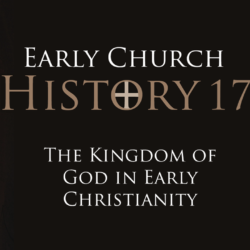This is part three of a series of three lectures on why some Christians ended up rejecting the kingdom message in the first few centuries of Christianity. In this part, I work through the major differences between how Jews and Greeks read scripture. What we find is that the Christians who didn’t like the kingdom idea lumped in those who did believe in it with the unbelieving Jews who rejected Jesus as the Messiah. In other words, kingdom advocates got labeled “Judaizers” for supporting biblical (literal) interpretations that the Jews were using to show that Jesus could not be the Messiah because he did not literally fulfill the kingdom prophecies.
This is lecture 13 of the Kingdom of God class, originally taught at the Atlanta Bible College. To take this class for credit, please contact ABC so you can do the work necessary for a grade.
Notes:
Christians Who Spoke Against the Kingdom as Too Jewish
Origen of Alexandria (3rd c.)
Now some men, who reject the labour of thinking and seek after the outward and literal meaning of the law…picture to themselves the earthly city of Jerusalem rebuilt with precious stones laid down for its foundations and its walls erected of jasper and its battlements adorned with crystal…Then, too, they suppose that ‘aliens’ are to be given them to minister to their pleasures, and that they will have these for ‘plowmen’ or ‘vinedressers’ or ‘wall-builders’…and they consider that they are to receive the ‘wealth of nations’ to live on and that they will have control over their riches, so that even camels of Midian and Ephah will come and bring ‘gold, incense and precious stones’. All this they try to prove on prophetic authority from those passages of scripture which describe the promises made to Jerusalem…and they quote from the scriptures many other illustrations, the force of which they do not perceive must be figurative and spiritual. Then, too, after the fashion of what happens in this life, and of this world’s positions of dignity or rank or supreme power, they consider that they will be kings and princes…And, to speak briefly, they desire that all things which they look for in the promises should correspond in every detail with the course of this life, that is, that what exists now should exist again. Such are the thoughts of men who believe indeed in Christ, but because they understand the divine scriptures in a Judaistic sense, extract from them nothing that is worthy of the divine promises. (De Principiis 2.11.2)
Eusebius of Caesarea (4th c.)
In addition to all these letters, he [Dionysius of Alexandria] composed two treastises, On Promises, occasioned by Nepos, a bishop of Egypt, who taught that the promises made to the saints in the divine Scriptures should be interpreted in a more Jewish fashion and that there would be a sort of millennium of bodily indulgence on this earth. (Ecclesiastical History 7.24)
Like the Jewish people who read the Scriptures literally, one could assume that it is the land of Palestine. But according to the deeper meaning, according to the final word, the high and heavenly and angelic word of God and the divine apostle of the “heavenly” Zion teaches that it is “the Jerusalem above, which is the mother of us all.” (Commentary on Isaiah 2.1-4)
And though the lion is carnivorous by nature, he shall be nourished with husks as a herbivorous animal. So too there are savage and coarse people who understand only the literal interpretation of the graces of the divine Scripture. The divine Scripture is the nourishing word of souls, but its secrets escape the notice of our minds, for the meaning is surrounded by a husk. (Commentary on Isaiah 11.7)
Jerome (5th c.)
He [Papias] is said to have published the Jewish opinion of one thousand years [of reign] at the Second Coming, a view shared by Irenaeus, Apollinaris, and others, who claim that after the resurrection the Lord will reign in the flesh with the saints. Tertullian also, in his work On the Hope of the Faithful, Victorinus of Pettau, and Lactantius are attracted by this same view. (On Illustriuos Men 18.4)
Tertullian (3rd c.)
Besides, your Christ promises to the Jews their primitive condition, with the recovery of their country; and after this life’s course is over, repose in Hades in Abraham’s bosom…As for the restoration of Judæa, however, which even the Jews themselves, induced by the names of places and countries, hope for just as it is described, it would be tedious to state at length how the figurative interpretation is spiritually applicable to Christ and His church, and to the character and fruits thereof; besides, the subject has been regularly treated in another work, which we entitle De Spe Fidelium. At present, too, it would be superfluous for this reason, that our inquiry relates to what is promised in heaven, not on earth. But we do confess that a kingdom is promised to us upon the earth, although before heaven, only in another state of existence; inasmuch as it will be after the resurrection for a thousand years in the divinely-built city of Jerusalem, “let down from heaven,” which the apostle also calls “our mother from above;” and, while declaring that our politeuma, or citizenship, is in heaven, he predicates of it that it is really a city in heaven.
Of the heavenly kingdom this is the process. After its thousand years are over, within which period is completed the resurrection of the saints, who rise sooner or later according to their deserts there will ensue the destruction of the world and the conflagration of all things at the judgment: we shall then be changed in a moment into the substance of angels, even by the investiture of an incorruptible nature, and so be removed to that kingdom in heaven (Against Marcion 25).
Jerome (5th c.)
[Those] who assert that the ceremonies of the old Law should be observed in the Church of Christ by the stock of faithful Israel, those should also look forward to a golden Jerusalem for a thousand years, that they may offer sacrifices and be circumcised, that they may sit on the Sabbath, sleep, become sated, drunk, and rise to frolic, their amusement being offensive to God (Commentary to Isaiah 53.12).
The wise Christian reader should retain this rule of prophetic promises: whatever the Jews and our Judaizers—or rather not ours—contend will happen carnally, we should show to have been accomplished already spiritually, so that we not be compelled to Judaize, according to the apostle, on account of these sorts of tales and tangled questions (Commentary to Isaiah 11.15-16).
Jewish Advantages
- older than Christianity
- more Jews than Christians
- superior access to Hebrew Bible
- more developed religious calendar
- reputation for spiritual powers
- better meeting places (Dura Europos a.d.256)
John Chrysostom
(2) But these Jews are gathering choruses of effeminates and a great rubbish heap of harlots; they drag into the synagogue the whole theater, actors and all. For there is no difference between the theater and the synagogue. I know that some suspect me of rashness because I said there is no difference between the theater and the synagogue; but I suspect them of rashness if they do not think that this is so. If my declaration that the two are the same rests on my own authority, then charge me with rashness. But if the words I speak are the words of the prophet, then accept his decision.
(3) Many, I know, respect the Jews and think that their present way of life is a venerable one. This is why I hasten to uproot and tear out this deadly opinion. I said that the synagogue is no better than a theater and I bring forward a prophet as my witness. Surely the Jews are not more deserving of belief than their prophets. “You had a harlot’s brow; you became shameless before all”. Where a harlot has set herself up, that place is a brothel. But the synagogue is not only a brothel and a theater; it also is a den of robbers and a lodging for wild beasts. Jeremiah said: “Your house has become for me the den of a hyena”. He does not simply say “of wild beast”, but “of a filthy wild beast”, and again: “I have abandoned my house, I have cast off my inheritance”. But when God forsakes a people, what hope of salvation is left? When God forsakes a place, that place becomes the dwelling of demons.…
(4) Three days ago-believe me, I am not lying-I saw a free woman of good bearing, modest, and a believer. A brutal, unfeeling man, reputed to be a Christian (for I would not call a person who would dare to do such a thing a sincere Christian) was forcing her to enter the shrine of the Hebrews and to swear there an oath about some matters under dispute with him…
(5) After I talked with him at great length and had driven the folly of his error from his soul, I asked him why he rejected the Church and dragged the woman to the place where the Hebrews assembled. He answered that many people had told him that oaths sworn there were more to be feared. (Against the Jews, Homily 1)
Jewish Challenges
- Their very existence presented a challenge
- They actively competed for converts
- Jewish denial centered on Jesus’ failure to fulfill messianic-age prophecy
Robert Wilken:
“If these prophecies have not been fulfilled historically, that is, these things are not happening, then the Messianic age has not arrived and Jesus cannot be the Messiah.”
Origen:
For the hard-hearted and ignorant members of the circumcision have refused to believe in our Savior because they think that they are keeping closely to the language of the prophecies that relate to him, and they see that he did not literally ‘proclaim release to the captives’ or build what they consider to be a real ‘city of God’…Further, they think that it is the wolf, the four-footed animal, which is said in prophecy to be going to ‘feed with the lamb’…and having seen none of these events literally happening during the advent of him whom we believe to be Christ they did not accept our Lord Jesus, but crucified him on the ground that he had wrongly called himself Christ. (De Principiis 4.2.1)
Allegory
- sacred texts (Homer)
- standard academic practice by Origen’s time
- Christian vs. Jewish Interpretations
Joseph Trigg writes:
“If the Bible is inspired by God but appears in places to be irrelevant to our condition, unworthy of God, or simply banal, we may take it for granted that we have failed to grasp its inner sense. If no spiritual significance is apparent on the surface, we must conclude that this surface, which may or may not be factual, is intended symbolically.”
Origen writes:
Moreover there are many prophecies spoken of Israel and Judah, which relate what is going to happen to them. And when we think of the extraordinary promises recorded about these people, promises that so far as literary style goes are poor and distinguished by no elevation or character that is worthy of a promise of God, is it not clear that they demand a mystical interpretation? (De Principiis 4.3.6)
What about the idea of two comings? Jesus comes the first time to redeem humankind and the second time to establish God’s kingdom on earth. Thus, the Messiah has come and he engaged in a lot of messianic activity, but he did not consummate the messianic age, yet. That is what he is coming back to do. This simple solution to the same problem frees us to accept the many kingdom prophecies and embrace “Jewish” interpretations. Thus when Jesus says the meek will inherit the earth, we need not insist that this has already happened (Matthew 5.5). When Daniel prophecies about a coming kingdom where all people, nations, and languages will serve the Son of Man (Daniel 7.13-14), we can simply accept this beautiful hope without engaging in interpretational contortions.
Furthermore, over the last century scholars have completely reversed their estimation of the importance of the Jewishness of Jesus. Following Albert Schweitzer’s devastating critique, The Quest for the Historical Jesus, in 1906, Jesus scholars became sensitive to the danger of reconstructing a Jesus in their own image. Now, people find a non-Jewish Jesus hard to believe. Often, the more Jewish one’s interpretation, the more plausible it is. The apocalyptic Jesus, proclaiming the coming reign of God on earth is immensely more believable than the sanitized belief in a disembodied heavenly existence of souls enjoying a beatific vision ad infinitum.
Links:
- More information on Kingdom Fest (Sept 8-10, 2017) available here.
- Read my paper “The Kingdom Is Too Jewish: Exploring the Intersection of Allegorizing and Judaizing vis-à-vis Millenarianism” from the 2015 Theological Conference
- Other Restitutio podcasts and posts on the kingdom of God
- visit KingdomUprising.com for more resources on the kingdom
- check out Anthony Buzzard’s The Coming Kingdom of the Messiah and Greg Deuble’s They Never Told Me This in Church
- Intro music: “District Four” by Kevin MacLeod. Licensed under Creative Commons: By Attribution 3.0 License.







De Principles Book from where that came ?
Origen’s book is called De Principiis or On Principles…it’s available online here: http://www.ccel.org/ccel/schaff/anf04.vi.v.ii.i.html